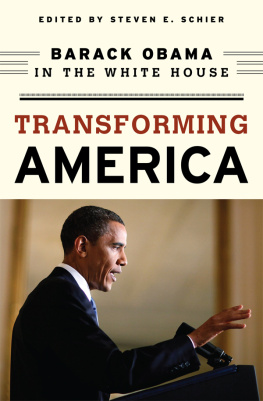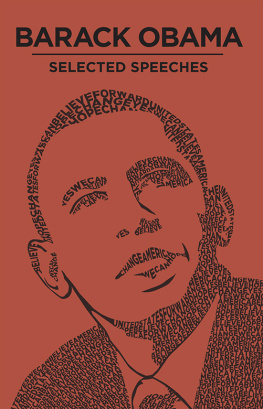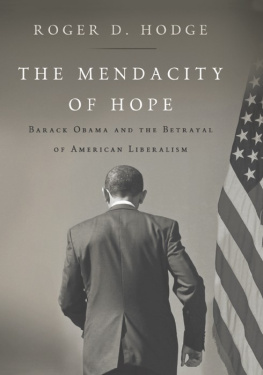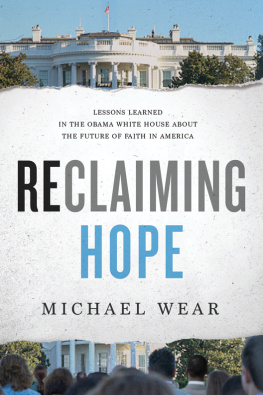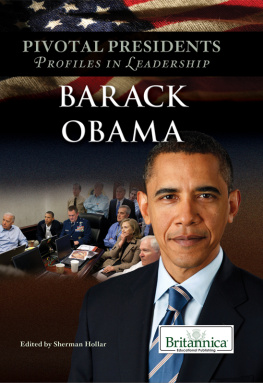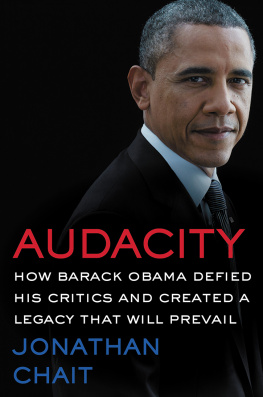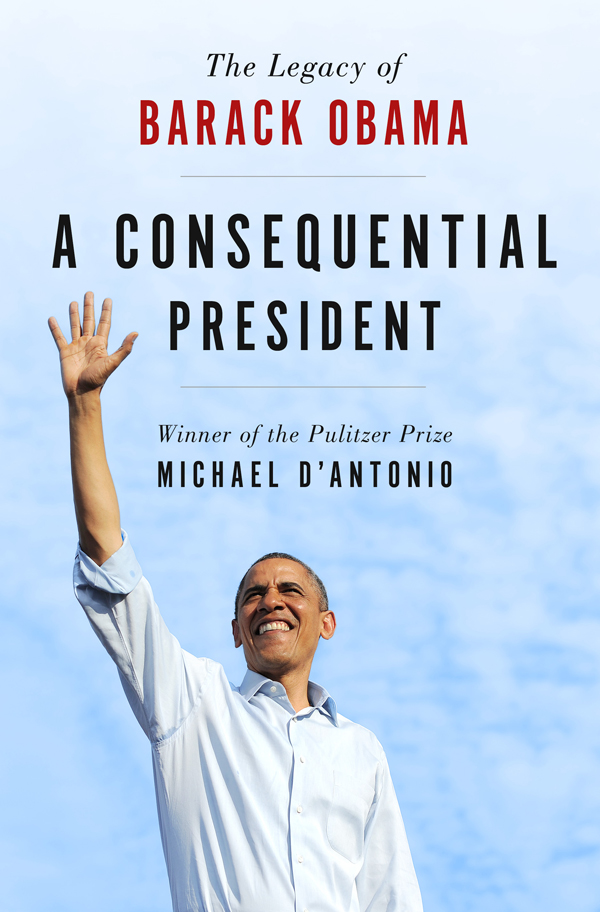Contents
Guide

The author and publisher have provided this e-book to you for your personal use only. You may not make this e-book publicly available in any way. Copyright infringement is against the law. If you believe the copy of this e-book you are reading infringes on the authors copyright, please notify the publisher at: us.macmillanusa.com/piracy.
For Toni
Black mascot of Wall Street oligarchs and a black puppet of corporate plutocrats.
Cornel West, 2011
One hundred days into his second term, Obama has already lost control of the agenda, if he ever had control in the first place. Dana Milbank, 2013
Unfortunately he still has not learned how to govern.
Maureen Dowd, 2013
With friends like his liberal critics, Barack Obama didnt need any Republican antagonists. Beginning with the academic/activist Cornel West, who campaigned for Obama to be elected in 2008 and then became a fierce critic, many top-rank figures on the Left criticized him with particular impatience because he had not met their expectations. None expressed the disappointment more pointedly than Maureen Dowd of The New York Times , who alternately attacked Obama as too cool and too emotional.
Dowds criticisms, like those voiced by Dana Milbank and Cornel West, were sharpened by the kind of disappointment that would inevitably arise among those who welcomed Obamas election with excitement. In November 2008 Dowd had called him elegant and disciplined and wondered, in print, if the nation might one day build an Obama monument in Washington. This enthusiasm was driven by three main factors. The first was the tragedy of George W. Bushs presidency and ruinous war in Iraq. The second was the optimism that so many felt as the nation elected its first black president. The third, and most significant, was the man himself.
Throughout his presidency, Obama would experience both a benefit and a burden based on the circumstances of his election. For a brief period, when the nation and most of the world felt profound relief that the Bush era was over, Obamas mere presence seemed enough to guarantee great success, However, the power generated by his popularity inspired an equal and opposite force among his political opponents, who determined to thwart him with a just-say-no response that was so consistent that they would reject Obama even when he offered to promote their own policies. This intransigence, combined with timidity in his own party, would deny Obama immediate, sweeping victories and require his administration to wage a daily struggle to claim progress by the inch.
Although many who were overcome with the sense of possibility when Obama was elected lost faith, the president and his administration adapted to the hyperpartisan reality in Washington. The administration sought advances wherever they could be achieved, using incremental legislative acts and regulatory shifts and the executives discretionary powers to make steady progress on the presidents agenda. Initiatives in energy, transportation, environmental protection, and foreign policy were tailored to complement each other. The result was not the revolution that some liberals had hoped to see, but the gradual progress the American political system permits.
The record, laid out here, shows a president whose calm and analytical temperament allowed for adaptation and perseverance. These qualities frustrated many of his backers because they seemed at odds with the energy Obama sometimes displayed as a leader. A truly inspirational figure, he was also a determined politician who was willing to do the hard, unglamorous work of legislating and steering a bureaucracy. This effort would directly improve the lives of American schoolchildren, workers, college students, and tens of millions who had been shut out of the health care system. Obama would restart the economy, set a modern record for job creation, reduce pollution, curb wasteful energy consumption, and make a start in the campaign against climate change. Roads, bridges, and railroads were rebuilt. Health care cost inflation was curbed. Soldiers were brought home from foreign conflicts, and outlaw countriesIran and Cubawere brought into the community of nations.
That Obama was both an outsider symbol and an effective insider in action made it difficult for some to recognize his many achievements, which were realized piecemeal. Those who expected him to be perfect, struggled to accept that he was, instead, extremely good. This is understandable given his rapid ascent from obscurity to worldwide acclaim.
An inspiring speaker who was both passionate and cerebral, Obama had followed a most unlikely path from the Illinois legislature, to the US Senate, to the Oval Office in just twelve years. In the previous century only two candidatesWarren G. Harding and John F. Kennedyhad gone directly to the White House from the US Senate. In the case of Obama, the country had elected, to the most powerful position in the world, a man who, in 2004, was little known outside Illinois. The big opportunity that transformed this politician with an unusual name into an immediate presidential contender came with a cell phone call that Obama received as he was campaigning for the US Senate. On the other end of the call he heard the voice of Mary Beth Cahill, who was Democratic presidential nominee John Kerrys campaign manager.
Cahills boss had been impressed by the forty-two-year-old Obama during a recent swing through the Midwest and had picked him to deliver the keynote address at the Democratic Partys 2004 national convention. But as she tried to deliver the news, Cahill had to dial three times, due to bad cell connections.
Yes, thats great, said Obama when he finally heard the request. Id be honored to do it.
The conversation was overheard by David Axelrod, Obamas chief political aide. As Axelrod would recall in his 2015 memoir, Believer, his candidate had already benefited from extraordinary good fortune. First, he had bypassed the usual route to political power and joined the political game in Illinois without the benefit of a patron. Then in the US Senate race his opponent, Jack Ryan, was forced to withdraw because his exploits at sex clubs had been revealed. (That Ryans wife at the time of the incidents was a semifamous actress and beauty pageant winner spiced up the scandal.) The invitation to deliver the keynote was another stroke of luck for Obama, albeit one that he had earned in his time with Kerry. Turning to Axelrod, Obama said, I know what I want to say. I want to talk about my own story as part of the larger American story. I want to talk about who we are at our best.
Axelrod had been pushing Obama to add heart to the basic speech he was delivering on the stump. The positive and personal themes Obama imagined for the convention showed that the message had gotten through. Instead of detailed policy prescriptions from the mind of a man who had taught constitutional law at the University of Chicago, the convention delegates would hear about shared hopes, feelings, experiences, and dreams. In the roughly three thousand words Obama wrote and showed to Axelrod, Obama described himself as part of a long national narrative of hope. He claimed the faith, grit, and patriotism that Republicans had long tried to reserve for themselves, and he called for unity in response to divisiveness.
The text would be true to the experience of a man who had been born in 1961 to a white mother from Kansas and a black father from Kenya and carried a nameBarack Hussein Obamathat often required an explanation. Obama could readily recall the challenges he had surmounted as a child in Hawaii and Indonesia and then as a young man trying to find his place in college and law school on the US mainland. Frequently denied the comfort of blending in with the majority, he had noted the assumptions he encountered in others and reflected on his own responses. Highly intellectual, he had made a study of human nature that caused him to regard people in a generously nuanced way. (Speaking of political adversaries, he would one day write that they are possessed of the same mix of virtues and vices, insecurities and long buried injuries, as the rest of us.) This process, combined with family influences and a calm demeanor, had made him a stubborn but realistic optimist. He was so cool that he couldnt be dragged into the gutter even when a notorious local gadfly tried to disrupt his 2004 campaign by insisting Obama was a Muslim who has concealed his religion.


